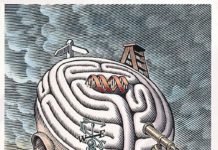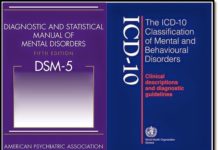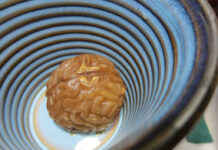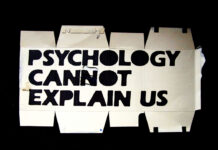Study Finds Heavy Metal Music Beneficial to Mental Health
A new study highlights the role heavy metal music plays in the mental health of adolescents facing adversity.
Trauma, Psychosis, and Dissociation
Recent years have seen an influx of numerous studies providing an undeniable link between childhood/ chronic trauma and psychotic states. Although many researchers (i.e., Richard Bentall, Anthony Morrison, John Read) have been publishing and speaking at events around the world discussing the implications of this link, they are still largely ignored by mainstream practitioners, researchers, and even those with lived experience. While this may be partially due to an understandable (but not necessarily defensible) tendency to deny the existence of trauma, in general, there are also certainly many political, ideological, and financial reasons for this as well.
Fighting for the Meaning of Madness: An Interview with Dr. John Read
Akansha Vaswani interviews Dr. John Read about the influences on his work and his research on madness, psychosis, and the mental health industry.
Mental Health Concerns Not “Brain Disorders,” Say Researchers
The latest issue of the journal Behavioral and Brain Sciences features several prominent researchers arguing that mental health concerns are not “brain disorders.”
What Does Social Justice Really Mean for Psychologists?
Without clarity and consensus around what social justice means, psychologists risk perpetuating injustices that undermine their stated mission.
Researcher Acknowledges His Mistakes in Understanding Schizophrenia
Sir Robin Murray, a professor at the Institute of Psychiatry, Psychology, and Neuroscience in London, states that he ignored social factors that contribute to ‘schizophrenia’ for too long. He also reports that he neglected the negative effects antipsychotic medication has on the brain.
Studies of Reared-Apart (Separated) Twins: Facts and Fallacies
Twin studies supply the most frequently cited evidence in favor of important genetic influences on human behavioral differences. In an extremely small yet influential handful of studies, twin pairs were said to have been reared apart in different families. Twin researchers and others view this occurrence as the ultimate test of the relative influences of nature (genes) and nurture (environment). According to this view all behavioral resemblance between reared-apart MZ twin pairs (known as “MZA” pairs) must be the result of their 100% genetic similarity, because such pairs share no environmental similarity. But, far from being separated at birth and reared apart in randomly selected homes representing the full range of potential behavior-influencing environments, and meeting each other for the first time when studied, most MZA pairs were only partially reared apart, and grew up in similar cultural and socioeconomic environments at the same time.
It is Time for Global Mental Health to Acknowledge Sociostructural Determinants of Distress
Researchers call for action to address social challenges and inequalities that obstruct mental health and well-being globally.
A Biopsychosocial Model Beyond the Mind-Body Split
Can a renewed biopsychosocial approach, grounded in an updated philosophy, foster person-centered medicine, and psychiatry?
New Data on the Adverse Effects of Meditation and Mindfulness
Study reports on the less-examined findings of difficult and painful meditation-related experiences.
The DSM-5 Field Trials: Inter-Rater Reliability Ratings Take a Nose Dive
The American Journal of Psychiatry (January, 2103) recently published a series of articles that analyzed the outcomes of the field trials that were conducted by the DSM-5 Task Force, to determine the inter-rater reliability of the multiple diagnostic categories that will comprise the DSM-5. A table below tracks the downward progression of inter-rater reliability from DSM-III through DSM-5.
Long-term Usage of ADHD Drugs Linked to Growth Suppression
Findings suggest that treatment not only fails to reduce the severity of “ADHD” symptoms in adulthood but is associated with decreased height.
Developing Alternatives to the DSM for Psychotherapists
A new article suggests counselors and psychotherapists are dissatisfied with current diagnostic systems and outlines some potential alternatives.
Mental Health Professionals and Patients Often Disagree on Causes of Symptoms
A new study finds that clinicians’ disregard for mental health patients’ insight into their own condition may be detrimental to treatment.
Psychosocially Oriented Psychologists Struggle Against the Medical Model
Interviews with psychosocially oriented psychologists demonstrate their experiences of discomfort with the hegemony of the medical model in their place of work and the conflicts that arise when they attempt to provide alternatives.
Violence Caused by Antidepressants: An Update after Munich
The media is now reporting details about the 18-year-old who shot and killed nine and wounded many others before killing himself on July 22 in Munich. My clinical and forensic experience leads to a distinction among people who murder under the influence of psychiatric drugs. Those who kill only one or two people, or close family members, often have little or no history of mental disturbance and violent tendencies. The drug itself seems like the sole cause of the violent outburst. On the other hand, most of those who commit mass violence while taking psychiatric drugs often have a long history of mental disturbance and sometimes violence. For these people, the mental health system seems to have provoked increasing violence without recognizing the danger.
The Invisibles: Children in Foster Care
Millions of current and former foster children experience multiple kinds of trauma, as documented in a six-part investigative series published in the Kansas City Star this month. Too often invisible, these young people deserve our attention and our care.
Recovery: Compromise or Liberation?
The 90s were labeled - rather optimistically - as the ‘decade of recovery.’ More recently, recovery has been placed slap bang central in mental health policy. Is supporting recovery pretty much good common sense? Or is the term being misused to pressure those suffering to behave in certain ways?
Belongingness Can Protect Against Impact of Trauma, Study Suggests
A new study explores feelings of belongingness as a protective factor for childhood trauma and adult mental health outcomes.
Five Decades of Gene Finding Failures in Psychiatry
Two generations of molecular genetic researchers have attempted, yet failed, to discover the genes that they believe underlie the major psychiatric disorders. The most recent failure is a molecular genetic study that was unable to find genes for symptoms of depression. Like most genetic researchers in psychiatry, the authors failed to consider the possibility that no such genes exist.
How Western Psychiatry Harms Alternative Understandings of Mental Health
An anthropological look at the Global Mental Health (GMH) movement suggests several ethical problems and contradictions in its mission.
United Nations Report Calls for Revolution in Mental Health Care
In a new report, the United Nations Special Rapporteur on the right to health, Dr. Dainius Pūras, calls for a move away from the biomedical model and “excessive use of psychotropic medicines.”
PTSD in Withdrawal
Can withdrawal from psychiatric drugging be so terrible as to leave you with Post-Traumatic Stress Disorder (PTSD) — to somehow rearrange your psyche for the worse even once time and hard work have undone the damage caused by the chemicals? To so profoundly alter your core self that you acquire a new diagnosis meriting special considerations or further treatment in order to resume a normal life again? If the real definition of insanity is “repeating the same mistake over and over and expecting a different result,” then embracing a psychiatric diagnosis of PTSD as a result of psychiatric damage would surely make you “insane”.
Brain Scans Cannot Differentiate Between Mental Health Conditions
A new study analyzing over 21,000 participants found that differences in activation of brain regions in different psychological “disorders” may have been overestimated, and confirms that there is still no brain scan capable of diagnosing a mental health concern.
An Alternative Perspective on Psychotherapy: It is Not a ‘Cure’
Kev Harding argues against conceptualizations of therapy as a ‘cure’ to an ‘illness’ and instead offers alternative approaches.



























